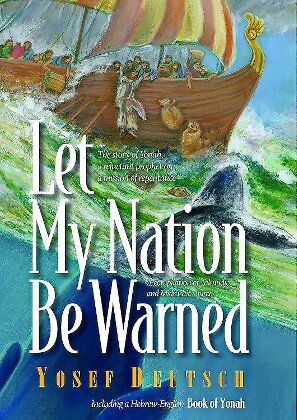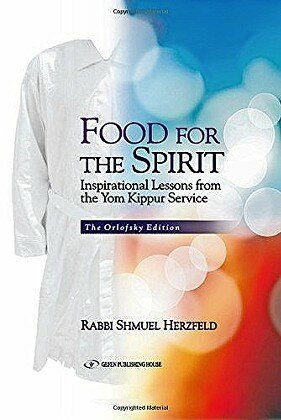Here’s a whale of a tale on behalf of repentance
With Yom Kippur just a few days away and Sukkos next week, this week’s essay will bring to your attention several books and essays devoted to the themes of teshuvah, repentance in the Jewish tradition.
Rabbi Yosef Deutsch concludes his excellent series of compilations of Talmudic and Midrashic sources on the holiday themed books from the Bible with his take on the Book of Jonah (“Let My Nation Be Warned,” Feldheim). In a story-like style, he details the action in this book with a dramatic flair that almost rivals the original.
Rabbi Deutsch notes:
“Over the centuries the book of Jonah has become one of the most familiar of the Bible because it is recited in its entirety as the haftarah every Yom kippur during the Minchah service, before the Ne’ilah prayer begins. This is the most auspicious moment of the holy day, when we have our last chance to repent and to repair our relationship with G-d. Therefore we read the story of Jonah, which speaks of the importance of repentance.
“We are reminded that it is impossible to escape from G-d and to thwart His will. Jonah suffered greatly because he attempted to avoid fulfilling his mission. We must fulfill ours if we want to be spared negative consequences. The Chafetz Chaim explains that sinners sometimes fail to repent because they don’t believe they can really change and be forgiven. But in the end the sinner must pay for his misdeeds, and if he doesn’t repent, he will suffer.”
The author goes on to answer the following questions: Who exactly was Jonah, and what made him attempt to refuse a divinely commanded mission? Did Jonah really believe that he could really avoid this command? And, why do we read this book specifically on Yom Kippur? Read this work and you will find out the whys.
Another take on the Jonah saga can be found in an excellent essay penned by Rabbi Eliyahu Safran of the Orthodox Union entitled, “Jonah and ISIS.” Centering on the destruction by ISIS of the tomb of Jonah, Rabbi Safran writes that the act railed “against G-d’s mercy and message.”
In destroying Jonah’s tomb, Rabbi Safran continues, ISIS sought “to destroy the hope that G-d brings to the hopeless. That the tomb had been located in Mosul, the modern name for Nineveh, adds poignancy and irony to the wickedness of these people.
“Even more, it is good to bear in mind that Jonah’s tomb was a shrine to Muslims as well as others. Certainly, ISIS would have preferred to have killed the prophet rather than just his tomb, but even these murderous barbarians cannot destroy G-d’s message and hope.”
Another observation can be read in an essay entitled, “The Prophet Jonah: Leadership and Taking Responsibility,” by Dr. Einat Ramon of Jerusalem. Her teachings are most worthy of your attention.
Mishpacha Magazine’s supplement, “Kolmus: The Journal of Torah and Jewish Thought,” contained an interesting essay by Osher Chaim Leverne, director of Orah in London, entitled, “Yonah: On Wings of Teshuvah,” which develops for us a deeper meaning behind Jonah’s activities and behavior.
Additionally, the Torah To-Go series featured an essay entitled, “The Failed Teshuva of Nineveh” by Rabbi Zvi Romm, distinguished rav of the Bialystoker Shul on New York’s Lower East Side. This essay makes for an appropriate compliment to the previous noted works and is most worthy of your attention.
Lastly, we have “Food For The Spirit: Inspirational Lessons from the Yom Kippur Service” (Urim Publishing), a book of lively essays by Rabbi Shmuel Herzfeld, rosh yeshiva of Yeshivas Elimelech and formerly senior rabbi of Ohev Sholom The National Shul in Washington and associate rabbi of the Hebrew Institute of Riverdale.
“One of the most powerful moments of our Yom Kippur liturgy is the recitation of the Yizkor prayers, when we recall with affection those no longer with us,” writes Rabbi Herzfeld.
“Is there anyone who wouldn’t want a second chance to speak with departed loved ones? Is there anyone who wouldn’t want another moment to just sit and hold their hands? To just sing with them or sit together with them around a Shabbat table?”
A Personal Note
At this time of year it is proper to consider those who are no longer a part of our daily lives. And even if you are not Yizkor-bound, think of those friends who passed away this past year, think of their families, children, grandchildren, of the widows and widowers, who still need the reach of your friendship. That, too, is the message of Yom Kippur. Just as we ask of G-d to remember us, it behooves us to remember others.
Gmar chasimah tovah to all my dear readers and their loved ones in the many years to come.
Originally published in 2014.

 61.0°,
A Few Clouds
61.0°,
A Few Clouds 







